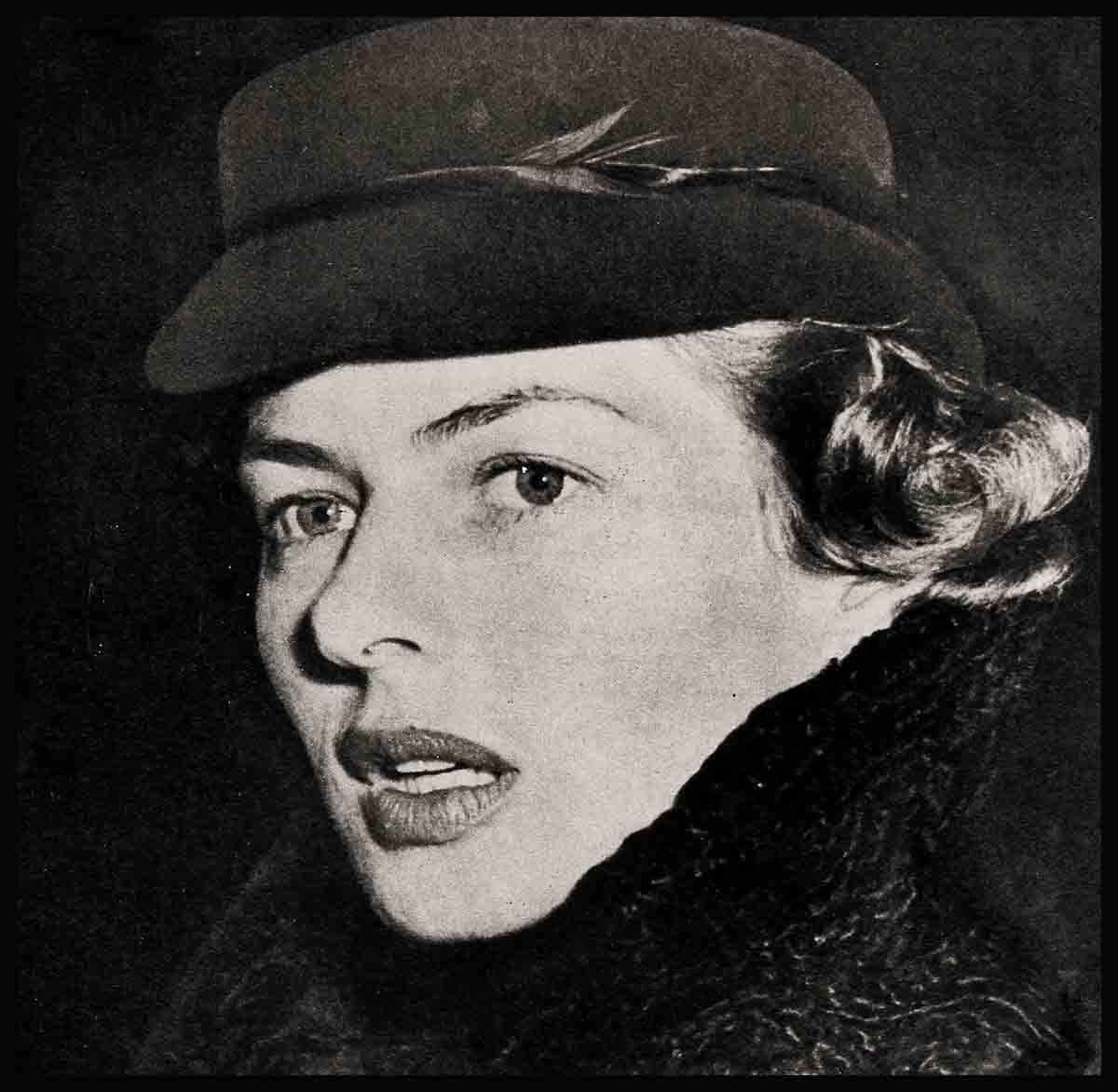
Behind Ingrid Bergman’s Closed Doors
Grahame Green, author of “The End of the Affair,” called on me in my Beverly Hills home when he was enroute from Saipan to England, and told me that Ingrid Bergman was his choice to star with Gregory Peck in the film version of his book. He has sold the rights to producer David Lewis, and the picture will be made in England this September.
If you haven’t read the story—one that’s going to be very difficult to put on the screen—it’s about a woman who, through an adulterous affair, reaches sainthood after suffering the emotional tortures of the damned. Said Green to me, “Ingrid is the perfect actress for the part. She even looks like the character, though I certainly didn’t have her in mind when I wrote it.” And David Lewis, who was present, said, “Why didn’t I think of her? The one I saw in the part was Jean Simmons.”
“No,” said Green, “she looks too young and inexperienced. Ingrid, whom I saw in London last year, is more beautiful than ever. There’s a new zest for living in the expression on her face. Her body’s slimmed down like a race horse, and with those luminous eyes of her, she can look like a saint.”
After the author and David Lewis had gone, I called Ingrid on the overseas telephone in Rome. She was much easier to reach than when she lived a block away from me in Beverly
Hills. She returned my call immediately. This time there was no press agent standing in her way, and I listened to the voice of a woman bubbling over with happiness six thousand miles from Hollywood. She was the same friendly Ingrid that I had known of old. She hesitated briefly before answering my question: “Would you like to play in The End of the Affair?” It seems her mind had to make the connection between her present contented state in Italy with a far away town called Hollywood. I asked a second time for her reaction about The End of the Affair.
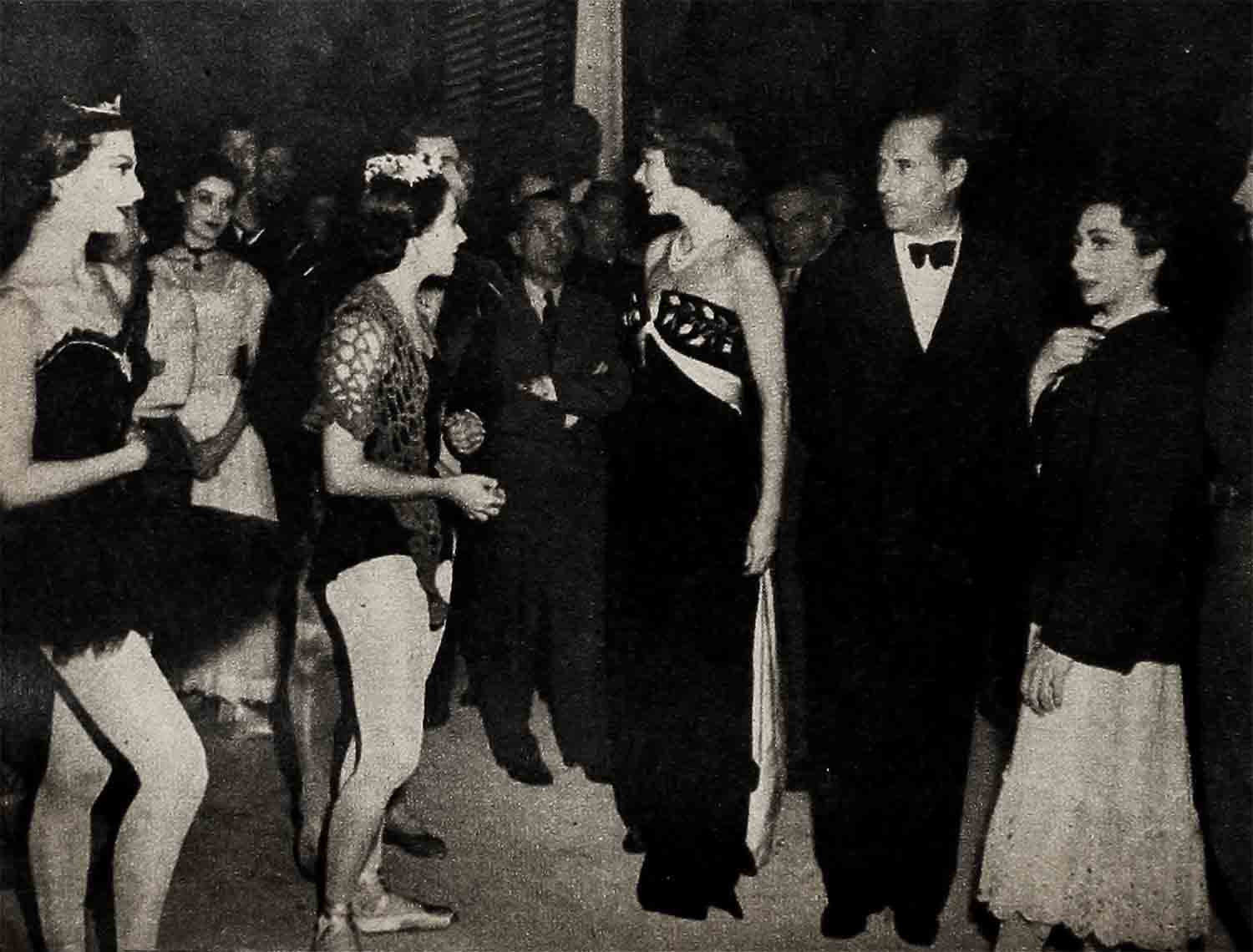
“Yes, I’ve read the book,” she said, “but I wouldn’t want to do the picture. I’m to start The Witness with my husband directing in September. I’d rather work for him than anyone else.”
She didn’t say so, but somehow I got the idea that perhaps the part in The End of the Affair too closely paralleled I know she’d like to forget both Stromboli and all the previously haloed aura cast about her during her life in Hollywood. And The End of the Affair would be certain to refresh the public’s memory. Besides, despite constant reports of her rifting with Rossellini, I know she’s deeply in love with him and really doesn’t care about working with anyone except him.
Ingrid told me she expects her new baby in June. She hopes for a girl. She has chosen no name for it, but, in accordance with Italian law, it will have to be an Italian name. I asked how many babies she planned on having. “Oh, I’ll just take them as they come,” she laughed. “I don’t know how many we’ll have.”
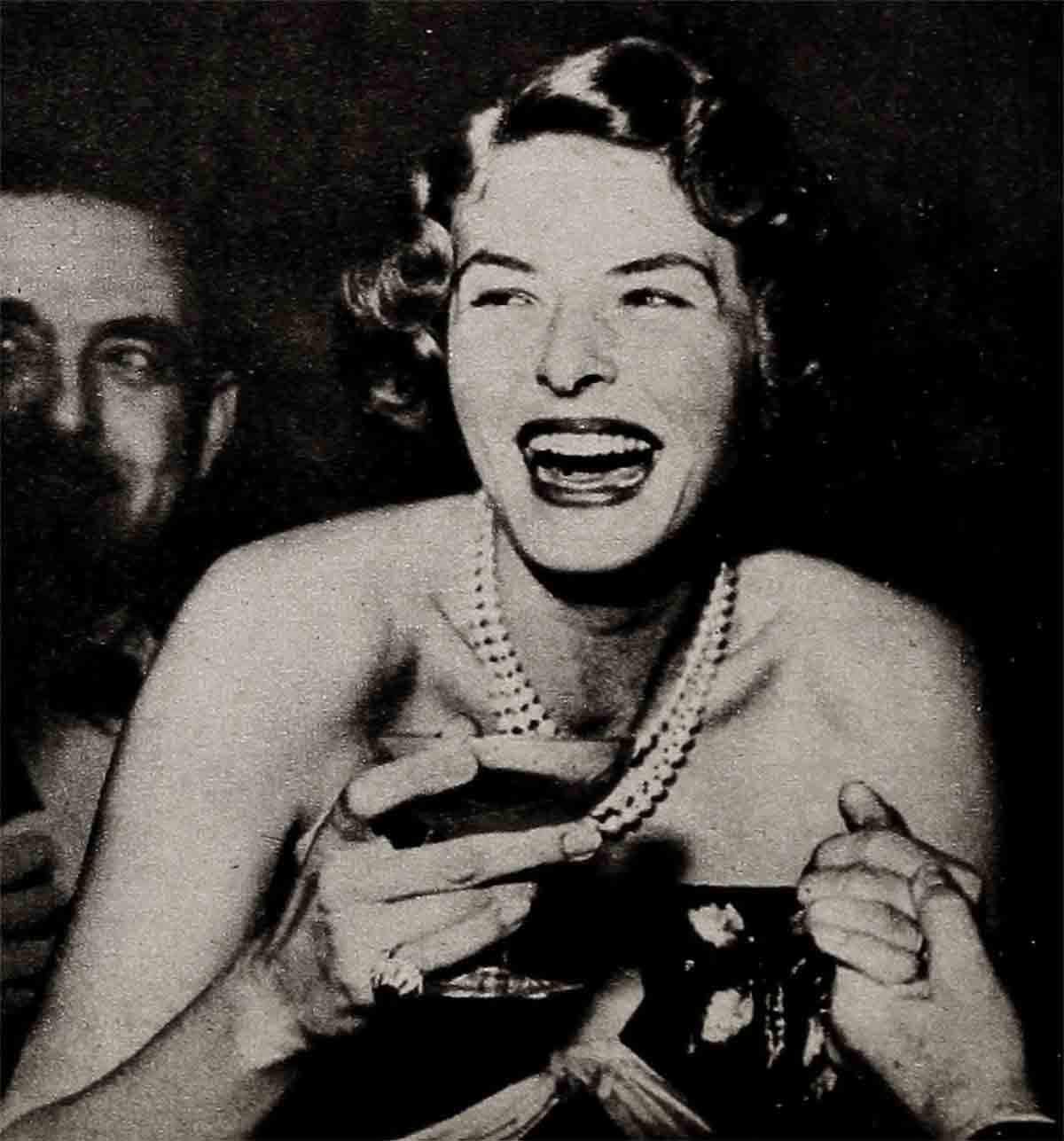
Then I told her that her daughter Pia had grown into a very beautiful girl and had acquired a lot of boy friends at Hawthorne School in Beverly Hills.
“Oh, that’s wonderful,” said Ingrid with a hearty laugh.
No trace of concern or wistfulness was in her voice. Obviously she has reconciled herself to the fact that Pia will remain with her father, and she will shed no more tears over the inevitable.
I know that she loves her daughter very much and for a while missed her bitterly while she fought so hard for her custody. But time changes everything, and with the passing years, her little son Robertino will do much to fill the void in his mother’s heart.
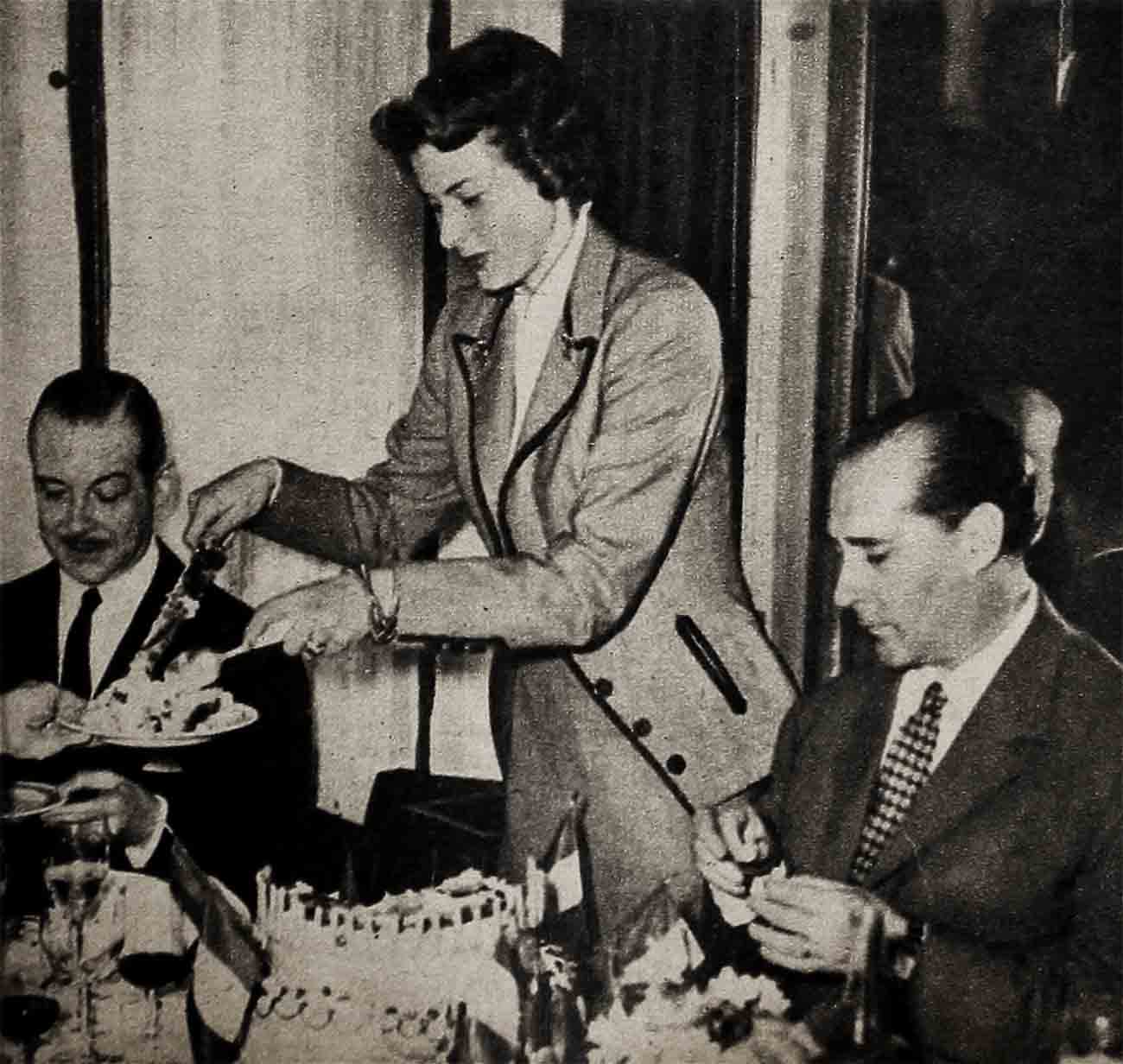
“Have you any regrets for what you’ve done?” I asked.
“No,” she replied, “I’m a very happy woman.”
“How do the Italians treat you?”
“I get the same star treatment on the streets here as I did in Hollywood, and my life is about the same as it was before. We have two homes—one in Rome and another in the country by the sea.”
“When I last talked to you you seemed rather bitter towards America because of the way the press handled your love story. Do you still feel the same way?”
“No,” was her quick response, “I have no bitterness whatever. How could I have when I’m so happy?”
Then I popped the $64 question. “Have you had any film offers from Hollywood?”
She immediately turned evasive. “I’d rather not go into that subject now,” said she.
“Well, let’s put it another way then. If you got a really good script and had to come to Hollywood to make the picture, would you do it?”
“No,” she replied without any hesitation. “Why should I when I have everything I want right here.”
Then I added, “You sound so happy, I think I’d better come over there and marry an Italian.”
She laughed and said, “If you’re serious I’ll find one for you.” And that was the end of our conversation.
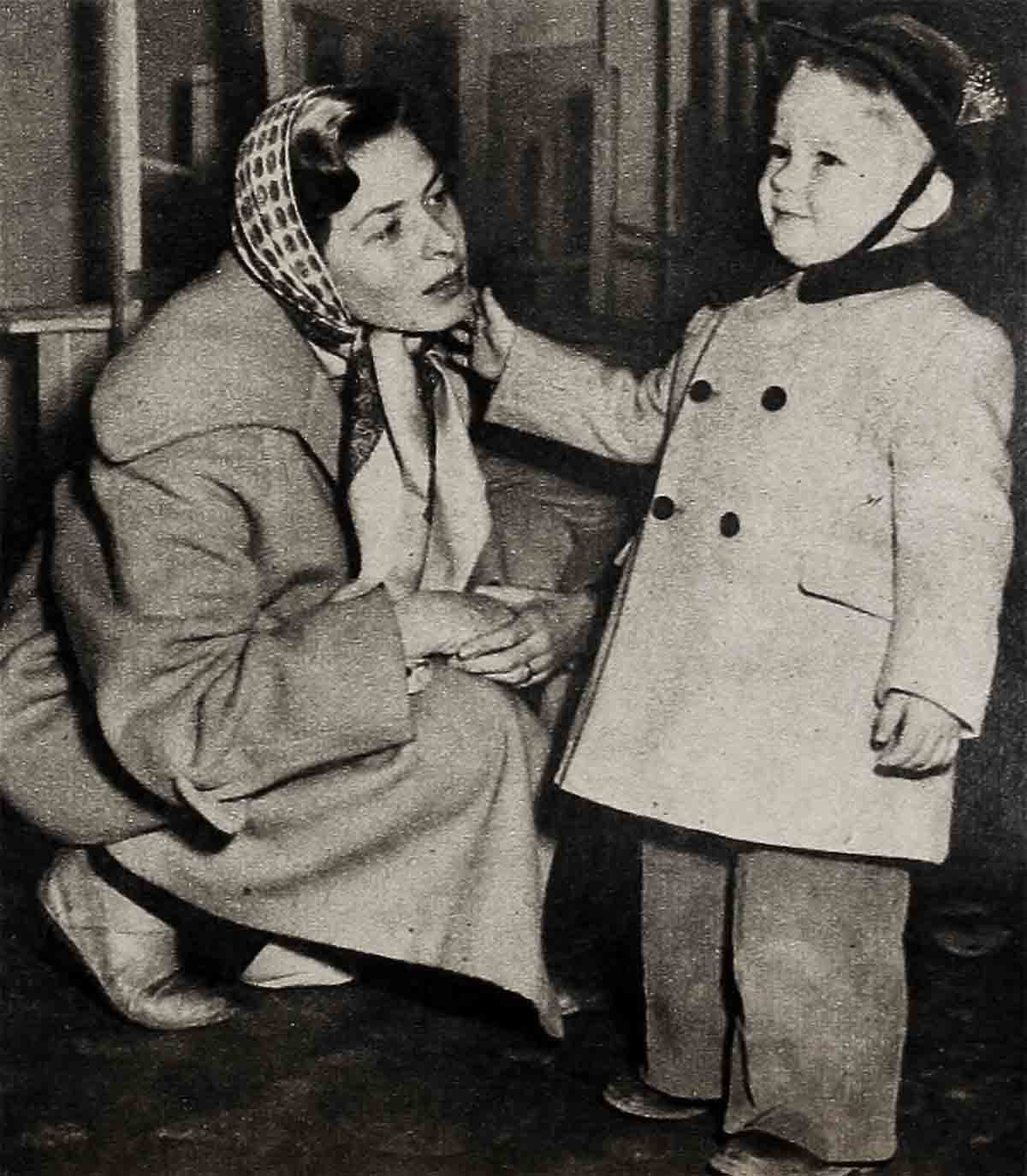
But as I always say, once an actress—always an actress. Once it’s in you, it stays. Babies come and babies go, but art goes on forever. Tossing a good script to an actor is like handing a lump of sugar to a horse. In both instances, the power of resistance is mighty low. However, I believe that Ingrid is really frightened of our town. The vicinity of her ex-husband and daughter would certainly produce some awkward situations, and the disenchanted press would no longer stand in awe of her.
When Ingrid Bergman was at the peak of her popularity in Hollywood, she was guarded like a rare jewel. Interviews, if granted at all, had the tenor of a royal gift; and contacting her on the telephone was well nigh impossible. She was surrounded by a solid wall of human beings— press agents, secretaries, servants, and David O. Selznick. It seemed that each wanted to acquire his priority on the star by giving her advice—much of it bad. I suppose that each one thought they had to earn their salaries some way.
At studio request, I sent an assistant to interview her while she was making Arch of Triumph. Ingrid was at the height of her fame, though she didn’t know it. With Charles Boyer as her co-star and a picture based on an Eric Remarque book, everyone thought the film couldn’t miss. It had to be great. Ingrid was treated like a queen. My assistant had to interview her while she was making herself up and examining costumes. Her former press agent paced nervously about the room and suggested that the interview would be closed immediately if it got tiring or annoying to Miss Bergman. My assistant would. have left right then had not Ingrid ignored the press agent and remained her gracious self.
In view of what has since happened, it is interesting to note that Ingrid was quite concerned about what her native Swedish fans would think of her playing the role of a fallen woman. The picture, despite all of its assets, proved to be a notorious flop. Ingrid tried Joan of Arc next.
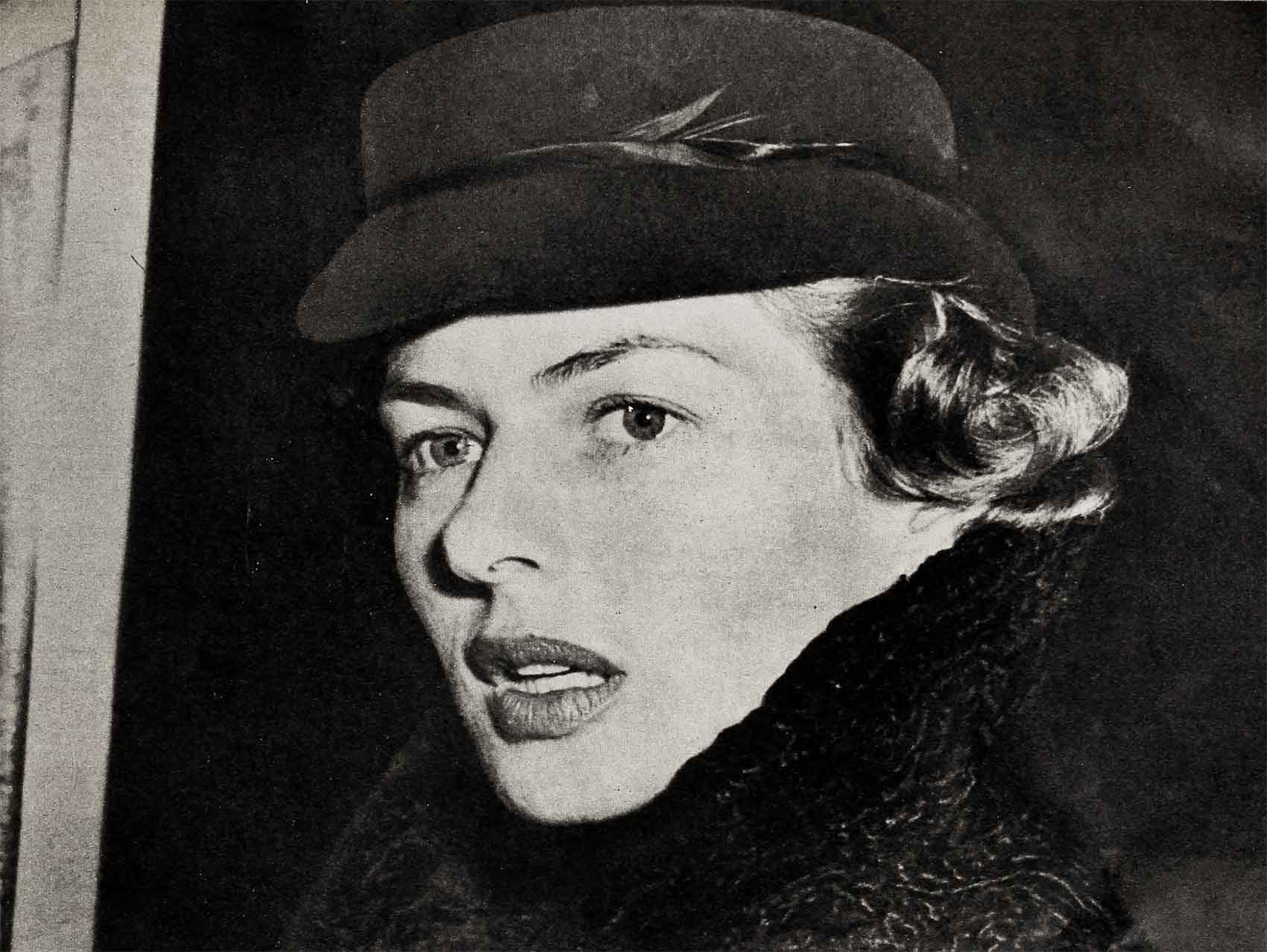
My same assistant visited the set, interviewed other actors, but deliberately skipped the star. He didn’t want to annoy her with such a triviality as publicity. Finally her same press agent came up to him and inquired anxiously, “Aren’t you going to talk to Ingrid?” Looking surprised, my man said, “Oh, do you think she’d be willing to talk to the press?” The agent assured him, “She’d love to talk to you.”
Since he had not set eyes on Ingrid since the days of Arch of Triumph, he couldn’t understand what he’d done to ingratiate himself with the Swedish star. He came to the sad conclusion, however, that there’s nothing more dismal than a fading star—unless it’s the job of selling a picture in which ten million dollars have been invested with no certainty of returns.
He talked to Ingrid and found her as gracious as she’d been on the previous occasion. But there was no mention of ending the interview by the press agent. He was typical of the people surrounding her during her Hollywood sojourn, and I think her fans, to understand her life today, should know about them.
During World War II, I volunteered to get stars to appear one night each week to work in the Canteen kitchen, signing autographs, or entertaining the G.I.’s. On one occasion I called the Selznick studio to get Ingrid for an appearance when another star had dropped out because of illness. The response I received was vague and completely unsatisfactory. So, tired of waiting for a yes or no, I got Ingrid on the phone.
Her answer was, “What time shall I be there, and what shall I wear?”
Later I tried to get her to appear at a benefit we were giving in Harold Lloyd’s garden for the Nursery School for Visually Handicapped Children. Ingrid’s personal telephone number had been changed, but I left a message which I feel sure was never delivered to her. She lived just across the road from the Lloyd estate and was one of the few important stars who wasn’t at the benefit. Ingrid loves kids, and I think she would have been very proud to lend a hand in raising $65,000 in one afternoon for many blind children.
While she was playing in Joan of Lorraine on the New York stage I attended the annual publishers convention in that city. I tried to invite her to the annual big party given by the New York Daily News for important editors and publishers from all over the nation. She could have won the hearts of all of them, I’m sure; but I couldn’t get through to her. There was the same press agent barring the way. Later when the Stromboli story broke, those same gentlemen of the press might have handled it more kindly had they had the opportunity of meeting her at the convention.
Although she practically became a legend, Ingrid was never a mystery to those who knew her and looked at her realistically. In Hollywood, she was honest and forthright, sometimes contradicting herself, but not unduly shy. After seeing her in Intermezzo over ten years ago, I wrote in my column, “She has a unique charm—child one moment, emotional woman the next. A sort of sophisticated novice.” I have since had little reason to change my opinion.
I know that she was very lonely when she first came here. She kept a picture of her daughter, Pia, pasted in her makeup kit and cried every day. A friend of mine used to find her wandering around alone at night on the foggy streets of Culver City. He warned her that the practice was dangerous. “But I’m so lonely,” she insisted, “and there’s nothing else to do. All my friends are so far away.”
I’m convinced now that her marriage to Dr. Peter Lindstrom was never as happy as it was touted to be. So she buried herself in acting. “Hollywood is the best place in the world to work,” she once said to me, “because there’s nothing else to do here.” I’ve noticed that she’s expressed no undue anxiety to do pictures since marrying Rossellini and living in Italy.
She explained to me why she insisted on keeping her husband’s name out of her interviews. “He’s in the medical profession,” said she, “and it’s unethical to involve a doctor in publicity.” Yet, when Rossellini came along, she involved Dr. Lindstrom in headlines that Hollywood’s most fantastic imagination could not have dreamed up. A member of the Stromboli crew told me that she and Rossellini, while making the picture, acted as naturally and naively as children, giving no thought to the fact that their names were making headlines together.
I have argued with her until I was practically blue in the face that one could not be a movie star without living in a goldfish bowl. She never got what I was driving at or at least did not admit it.
When she was making Joan of Arc, we had a long session in her dressing room. “After coming here, I didn’t understand English very well and gave out statements that the newspapers misinterpreted,” she said. “That’s one reason I avoid interviews now.” “Well, you understand English perfectly now,” I answered. “And do you believe in this picture?” She looked at me in a surprised manner, saying, “With all my heart. I’ve wanted to play Joan ever since I was a little girl.” I told her then that if she believed in the picture, if it meant that much to her, she ought to help publicize it so that everybody in the country would know about it. She stared into space, still seeming not to get my point.
I saw her last in Rome; and she was boiling mad at the Italian papers. That day one of them had announced she was expecting a baby. She was living in a nondescript apartment which I had to climb four flights of stairs to reach. Ingrid, without make-up or stockings, was wearing a plain blue cotton dress and pacing the floor like an enraged animal when I entered. As she cried out against the world that was flaying her for her unconventional actions with Rossellini, she used profanity, which I’d never heard her do before. “Americans think they own me. But I have my own life to live. Is it a sin to fall in love?”
This was a question she alone could answer. “It’s your problem, and you’ve got to face it,” was all I could say to her. Then she became even more illogical. “But I’ve been a good wife, not an actress with a long record of romances,” she argued.
“That’s just it,” said I. “The world bought you as a dream. You smashed it. Now people are mad, thinking they’ve been duped.”
Then I asked Ingrid the truth about her expecting a child. She denied it. The date was August 9, 1949, but the rumor was spreading all over Europe, so I, being on the job as a reporter, put it in my column as such. Some months later, a few days before the Christmas holidays, the story broke into the headlines.
In Beverly Hills, Ingrid had been a neighbor of mine, living less than a block from me on a hilltop home that had originally been built as a playhouse. I was present on a New Year’s Eve when the place was christened. We sang Irish songs and square-danced. Everybody had a wonderful time.
When Ingrid bought the place, she made many additions, but I never heard of her giving a big party there. No wonder she thought Hollywood was dull. She engaged so little in our social life. While his wife was in New York with Joan of Lorraine, Dr. Lindstrom added a swimming pool to their grounds and had the whole place enclosed by a wire fence 12 feet high. One no longer dropped in on Ingrid as a neighbor. That fence was there, forbidding and uninviting. But Ingrid was a free soul; and nothing—no person or steel wall—was going to hem her in. Her wings would not be clipped.
I’m not passing moral judgment on Ingrid. That’s for her and her conscience to decide. I’ve had many letters on the case. Some say: “Bravo for the girl who had the courage to follow the dictates of her own heart despite public opinion.” Others say, “Let her stay in Italy. We don’t want her.”
Certainly we can not forget moral discipline and set her up as an example for our youth. But are we to continue condemning her when she has tried after her. original indiscretion, to conform to society’s dictates in her search for happiness? There will always be two schools of thought on that as long as the affair is discussed. And only the public can determine the future of her career.
If people go to see her pictures, she may come back stronger than ever. If they don’t she’ll be through as a film star. The final judgment lies with the public, as always.
“If it had been anybody but Ingrid,” I’ve heard people say with a sad shake of the head, as if a holy idol had fallen. They either forget or do not know that she never aspired to saintliness. It was a cloak that publicity and fans had wrapped around her; and the measure didn’t fit. “I’m first and last a mother and a wife,” she told a writer in explaining why she had to have dinner with her family even when working in pictures. Some may say, “A fine mother and wife she proved to be! Didn’t she desert her husband and daughter?” Others might say, “Well, isn’t she a faithful wife and mother now?” There’s the enigma.
I think The Bells Of St. Mary, more than any other picture, served to build that saintly legend about Ingrid; and I connived with Leo McCarey to get her into the film. Very often an actress, through sheer talent, carries the impression she gives in a role into her private life as the public sees her. That’s what Ingrid did with Bells. She would never have done that picture without Leo McCarey’s persistence and help from Hopper. David Selznick was supposed to star her in The Scarlet Lily, but never got around to making it.
But when Ingrid read in my column that Leo wanted her opposite Bing Crosby in Bells; she acted characteristically. She didn’t beat around the bush. She was extremely anxious to play a nun. So she went directly to Leo and got the part. And she had a serious quarrel with David Selznick about it. Finally he agreed, but only after it cost Leo McCarey $450,000 for her services.
An apt person she was for it, too. Ingrid was one of the first to break down the pattern of movie glamor girls who thought looking like the next star was a prime requisite for film success. She used little makeup, usually applied it herself. On her first return to Sweden, Ingrid told me, all the actresses were eager to hear what she’d learned about makeup in America. She told them, “Nothing. I still do my own.” So naturally they thought she was getting nowhere in pictures.
A publicity man working on Intermezzo cast about for a word to describe her appearance and came up with “translucent beauty.” The term, arrived at in such a haphazard manner, was fitting then as it is today. Her skin has a warm, healthy glow, as if fed from some inner fire, and that added to the saintly legend.
When Ingrid came to Hollywood, girls were made to appear synthetic princesses. They were short on royalty, but long on synthetic qualities. Their hair carried too much bleach, too much wave, their faces too much makeup. The false eyelashes were too long, the lips oversized instead of natural. But the queens of the cinema, supposedly women apart, had to look different from ordinary human beings. Or so they thought.
Then along came Ingrid who wouldn’t fall for this line of guff. Depending upon her natural good looks, she dusted her well-scrubbed face with some powder, applied a small amount of lipstick, and was ready for the camera. She didn’t need fabulous costumes. She looked better in a simple skirt and blouse with a scarf tied casually around her neck. Yet Ingrid was a director’s dream. She could be photographed from any angle and always looked good. The late director Victor Fleming called her “bullet proof.”
I don’t think Ingrid ever quite grew up and that was part of her charm. She hated being stared at, yet she confessed to me she couldn’t help staring at other celebrities. “I don’t think I’m important as a person,” she once said to me, “but my work as an actress is.” That was the basis of her naive conclusion that she could quit being a movie star when she stepped off a sound stage; a conclusion that got her into much trouble. Rossellini was somewhat of the same opinion. Both simply refused to believe that one couldn’t shed fame as one does clothes. But they’re learning; and they’re acquiring a respect for the awful power of the press and aroused public opinion.
Right now Ingrid feels an essential security in Rossellini’s presence. He was a party to her sin, if such it was, and I don’t believe she’d feel at ease working with another director, especially if Rossellini weren’t beside her.
Hollywood producers will star almost anyone if they feel he’ll be good boxoffice. So the real question in their minds is whether the American public will go for Ingrid or not. They’re being cautious, and are waiting to see the reception given Europe, 1951, the film Ingrid did with Rossellini, before going all out to get her back. Nobody can deny she’s a fine actress, but American movie-goers are peculiar people.
I think Ingrid would willingly come back if she were certain that the American public wanted her. She wants us to like her again, but not in a saintly manner. She prefers being regarded as a woman with normal faults and desires. She’s learned at last, whether she likes it or not, that she’s a public figure. But the one thing that would bring her back to Hollywood causing her to sacrifice her pride, is contained in her statement to me: “I’m only important as an actress—as a person, no.”
THE END
—BY HEDDA HOPPER
It is a quote. MODERN SCREEN MAGAZINE MAY 1952




